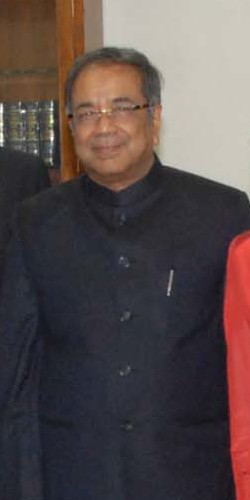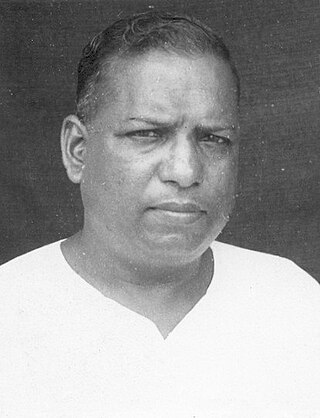Related Research Articles

The Rajya Sabha,constitutionally the Council of States,is the upper house of the bicameral Parliament of India. As of 2022,it has a maximum membership of 245,of which 233 are elected by the legislatures of the states and union territories using single transferable votes through open ballots,while the president can appoint 12 members for their contributions to art,literature,science,and social services. The potential seating capacity of the Rajya Sabha is 245,according to article 80 of the Indian Constitution. Members sit for staggered terms lasting six years,with about a third of the 238 designates up for election every two years,in even-numbered years. Unlike the Lok Sabha,the Rajya Sabha is a continuing chamber and hence not subject to dissolution. However,the Rajya Sabha,like the Lok Sabha,can be prorogued by the president.

The Lok Sabha,constitutionally the House of the People,is the lower house of India's bicameral Parliament,with the upper house being the Rajya Sabha. Members of the Lok Sabha are elected by an adult universal suffrage and a first-past-the-post system to represent their respective constituencies,and they hold their seats for five years or until the body is dissolved by the President on the advice of the council of ministers. The house meets in the Lok Sabha Chambers of the Sansad Bhavan,New Delhi.

The Parliament of India is the supreme legislative body of the Republic of India. It is a bicameral legislature composed of the president of India and two houses:the Rajya Sabha and the Lok Sabha. The president in his role as head of the legislature has full powers to summon and prorogue either house of Parliament or to dissolve the Lok Sabha. The president can exercise these powers only upon the advice of the prime minister and his Union Council of Ministers.

The 14th Lok Sabha was convened after the 2004 Indian general election held in four phases during 20 April –10 May 2004,which led to the formation of first Manmohan Singh ministry (2004–2009). Indian National Congress-led United Progressive Alliance won 62 more seats than previous 13th Lok Sabha. The Lok Sabha is the lower house in the Parliament of India. 8 sitting members from Rajya Sabha,the Upper House of Indian Parliament,were elected to 14th Lok Sabha after the 2004 Indian general election.

The Second Lok Sabha was elected after the 1957 Indian general election. The 2nd Lok Sabha lasted its full tenure of five years till 1962.

This is the list of members of the 12th Lok Sabha,after the 1998 Indian general election held during February–March 1998. This was the second consecutive Lok Sabha,like the 11th Lok Sabha elections that did not provide the country with a stable government. Atal Bihari Vajpayee became the 16th Prime Minister of India but the government lasted for only about thirteen months due to no clear mandate. Also,the party was not able to get support from other parties,after the withdrawal of support by AIADMK. After his resignation,then President K. R. Narayanan asked Sonia Gandhi,the leader of the opposition in the Lok Sabha to form the government;however,Gandhi responded that the UPA would not be able to form a government at the center,following which President Narayanan dissolved the House. The next General elections of 1999 for 13th Lok Sabha provided India a stable government that lasted for full five years. Nine sitting members from Rajya Sabha,the Upper House of Indian Parliament,were elected to 12th Lok Sabha after the 1998 Indian general election.

General elections were held in India in April–May 1996 to elect the members of the 11th Lok Sabha. The result of the election was a hung parliament,which would see three Prime Ministers in two years and force the country back to the polls in 1998. Atal Bihari Vajpayee of Bharatiya Janata Party,the single largest party to win this election,winning 67 more seats than previous 10th Lok Sabha,formed the government which lasted for only 13 days.

List of Members of the 3rd Lok Sabha,elected February–March 1962. The Lok Sabha is the lower house in the Parliament of India. The election was held for 494 seats out of which Indian national congress won 361 seats. 14 sitting members from Rajya Sabha were elected to 3rd Lok Sabha after the 1962 Indian general election.

T. K. Viswanathan is the Secretary General of the 15th Lok Sabha and Lok Sabha Secretariat,Parliament of India,i.e. the House of the People in the Indian Parliament. As Secretary General,he is also the Administrative head of the Secretariat of the Lok Sabha. The post of Secretary General is of the rank of the Cabinet Secretary in the Government of India,who is the senior most civil servant to the Indian Government. The incumbent to the post is appointed by the Speaker of Lok Sabha in consultation with the Prime Minister of India and the Leader of the Opposition in the Lok Sabha. As per precedence,incumbents to the post of Secretary General have either been senior officers in the Lok Sabha Secretariat or senior civil servants in the Government of India.
Basanta Kumar Das was an Indian Politician belonging to the Indian National Congress. He was elected to the Lok Sabha,the Lower house of Indian Parliament from Contai constituency,West Bengal in 1952 and 1962. He was earlier a member of the Constituent Assembly of India representing West Bengal.
Valmiki Choudhary was an Indian politician. He was elected to the Lok Sabha,the lower house of the Parliament of India from the Hajipur in Bihar as a member of the Indian National Congress.
Raj Banshi Mahto is an Indian politician. He is currently member of Bihar Assembly from Cheriya Bariyapur Vidhan Sabha. He was elected to the Lok Sabha,the lower house of the Parliament of India from the Balia in Bihar as a member of the Rashtriya Janata Dal.
Rudrasen Chaudhary is an Indian politician. He was elected to the Lok Sabha,the lower house of the Parliament of India as a member of the Bharatiya Janata Party.
Surendra Mohan Ghose was an Indian politician in the Jugantar Party during the time of Indian Independence,and a close associate of Sarat Chandra Basu and Maharaj Trailokyanath Chakraborty. He was elected to the lower House of Parliament the Lok Sabha from Malda,West Bengal as a member of the Indian National Congress. He was a member of the Constituent Assembly of India representing West Bengal.
Prabin Chandra Sarma is an Indian politician. He was elected to the Lok Sabha,lower house of the Parliament of India from Gauhati,Assam in the 1996 Indian general election as a member of the Asom Gana Parishad.
Anand Chandra Joshi (1908-1973) was an Indian politician elected to the Lok Sabha,lower house of the Parliament of India from Sidhi,Madhya Pradesh as a member of the Indian National Congress.

Mohan Nayak was an Indian politician. He was elected to the Lok Sabha,the lower house of the Parliament of India as a member of the Indian National Congress.
Mahanth Shyam Sunder Das is an Indian politician. He was elected to the lower House of the Indian Parliament the Lok Sabha from Sitamarhi,Bihar as a member of the Janata Party.
Birbal Ram is an Indian politician. He was elected to the Lok Sabha,the lower house of the Parliament of India from Ganganagar,Rajasthan as a member of the Indian National Congress.
Rajshekhar Kolur is an Indian politician who served as a Member of Parliament in 6th Lok Sabha from Raichur Lok Sabha constituency.
References
- ↑ "First non-Sikh MP from city". The Indian Express. 17 May 2019. Retrieved 20 September 2021.
- ↑ Indian Parliamentary Companion: Who's who of Members of Lok Sabha. Lok Sabha Secretariat. 2003. p. 164.
- ↑ Lok Sabha Debates. Lok Sabha Secretariat. 1989. p. 241.